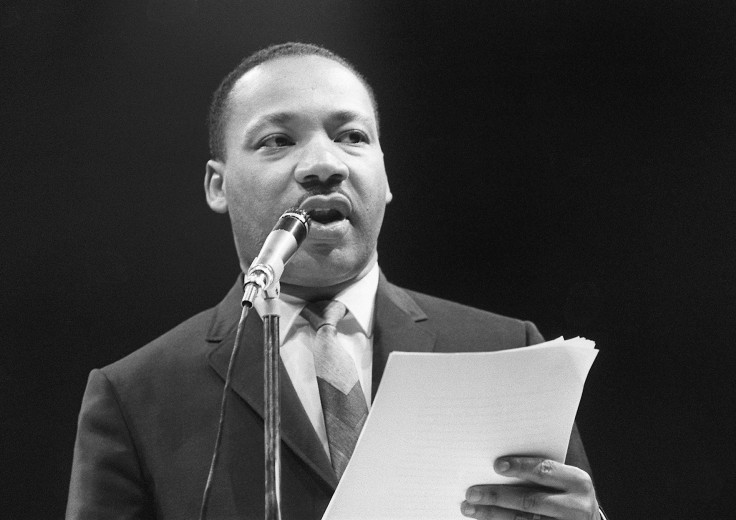Martin Luther King Obituary: Read How Newspapers Reacted To MLK's 1968 Assassination

When the revolutionary civil rights leader Martin Luther King Jr. was assassinated on April 4, 1968, the world was stunned. But as rioters and mourners began to fill the streets, newspaper employees were hard at work putting together stories about the activist for the next morning's issues.
"A Voice Has Been Stilled," wrote the Pittsburgh Courier. "Gunned Down in Memphis," reported the New York Daily News. "King Murdered!" screamed the Chicago Daily Defender.
In the days after King's death, major media outlets both in the United States and abroad covered the minister's life and legacy in many ways. This Martin Luther King Jr. Day, read excerpts from their editorials, articles and obituaries below.
From the New York Times on April 5, 1968:
...There was little of the rabblerouser in his oratory. He was not prone to extravagant gestures or loud peroration. His baritone voice, though vibrant, was not that of a spellbinder. Occasionally, after a particular telling sentence, he would tilt his head a bit and fall silent as though waiting for the echoes of his thought to spread through the hall, church or street.
In private gatherings, Dr. King lacked that laughing gregariousness that often makes for popularity. Some thought he was without a sense of humor. He was not a gifted raconteur. He did not have the flamboyance of a Representative Adam Clayton Powell Jr. or the cool strategic brilliance of Roy Wilkins, head of the National Association for the Advancement of Colored People.
What Dr. King did have was an instinct for the right moment to make his moves. Some critics looked upon this as pure opportunism. Nevertheless, it was this sense of timing that raised him in 1955, from a newly arrived minister in Montgomery, Ala., with his first church, to a figure of national prominence...
And here's the front page of the @courierjournal on April 5, 1968 — the day after #MLK was fatally shot in Memphis. pic.twitter.com/pyM4jB9d5K
— Eric Burse (@EricBurse) January 19, 2015From the Washington Post on April 5, 1968:
Martin Luther King is the victim of a cruel and wanton act that will be deplored from one end of this country to the other. There is about this assault upon the great Negro leader the same kind of wanton senselessness that overtook the man whose tactics he emulated -- Mahatma Gandhi. Men of good will, noble purpose and pacific impulses enjoy no immunity from violence, no matter how they shun it in their personal conduct.
Those who are responsible for this vile deed have killed an unoffending, God-fearing and innocent man of great goodwill; they have also killed something in the spirit and heart of the American people where lived the bright hope for reconciliation between the races.
That hope will be resurrected ... It is possible to kill men like Martin Luther King, but the ideas for which they stand are not mortal or destructible ...
From the Baltimore Sun on April 5, 1968:
The killing of Martin Luther King is a national tragedy, the consequences of which are not readily foreseeable. His was the voice of inspiration for millions of American Negroes. His was the marching figure of undaunted insistence on individual rights and respect. From the 1965 days of the Montgomery (Ala.) bus boycott, his was the stride toward freedom that remained unbroken and drew an impressive following while others faltered or flamed out and went off in diverse directions.
White resentment of Dr. King and at times overt hostility accompanied his every move. Even those in full sympathy with what he was trying to do had occasion to question his tactics. But now that he lies dead there must come the overwhelming realization that there was none other of his stature, that he was man committed to a Gandhian principle of non-violent passive resistance who again and again demonstrated that social changes could be brought about through peaceful means. His voice is needed today, and it will be needed tomorrow, but it has been brutally stilled ...
#MLK assassination: front-page headlines and photos from newspapers all across the country: http://t.co/g8V3lZbg1v pic.twitter.com/1keQEQuVKC
— GenealogyBank (@GenealogyBank) April 4, 2014From the Guardian on April 5, 1968:
... King was above all a man of the Negro South. He knew for himself the deep and hopeless fatigue, the age-long tiredness, that hangs over the whole communities in the black belts of Georgia, Alabama, and Mississippi.
He knew the energy and power that slumbered there, but which only made itself felt in the feet of the few who migrated to the North in the hope of better things, or the voices that turned to the blues and the hymns and the spirituals.
King's genius was to waken that energy and send it out into the streets of the South, marching for justice and social change ...
And from United Press International on April 9, 1968:
Martin Luther King was entombed today after a funeral tribute which saw his body borne on a creaking wooden, mule-driven wagon in a funeral march of 150,000 persons.
"The cemetery is too small for his spirit," said Dr. Ralph Abernathy, successor to Dr. King as leader of the Southern Christian Leadership Conference. "But we commit his body to the ground."
Dr. King was buried in South View Cemetery, the resting place of slaves ...
© Copyright IBTimes 2024. All rights reserved.






















